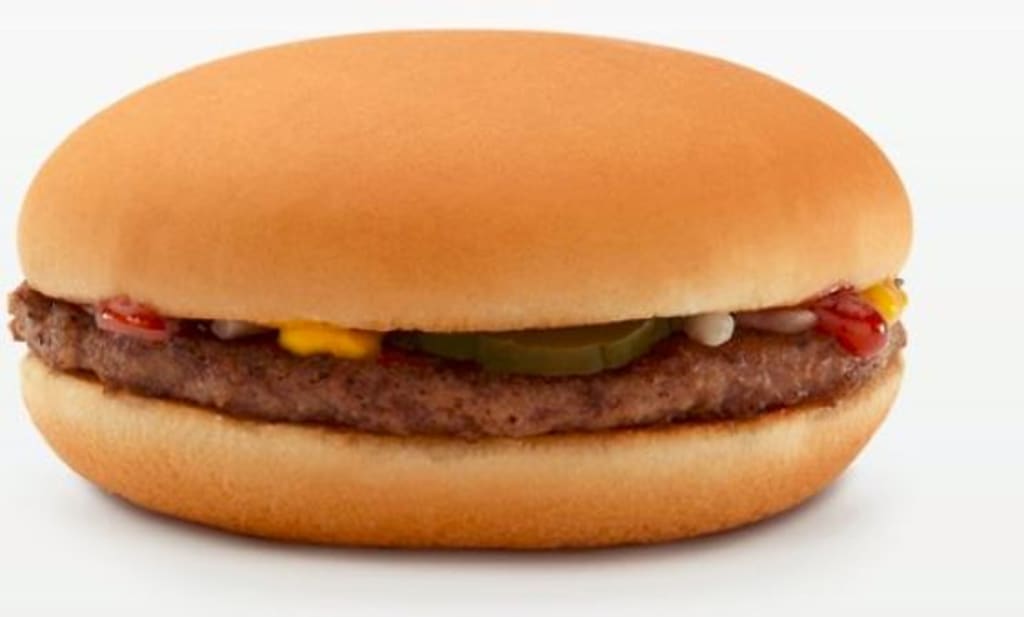Why Burger Is My Favourite Word
The beautiful complexity of the English tongue

Difficult decision deciding which story with which to introduce myself to Vocal, so here's something a bit niche, but hopefully still interesting.
I studied English at university, and I also worked at McDonald’s to fund my way through the process. Not much overlap you might think, but working in McDonald’s went hand in hand with my studying of English and lead to ‘burger’ becoming my favourite word. Just hear me out.
In a McDonald’s kitchen, everything ordered at the till flashes up on a big screen so the “chefs” know what to make. When the item is part of a happy meal, however, it is preceded with the initials ‘HM.’ For example, instead of ‘chicken wrap,’ it would say ‘HM chicken wrap.’ The reason for this additional information given to kitchen staff still escapes me, but is irrelevant. What is relevant is that customers in the drive-thru see the same screen as kitchen staff, so when they order a hamburger happy meal, it flashes up with ‘HM hamburger.’ This is where the confusion begins, as many people think ‘HM’ looks like ‘HAM.’ So when they order a cheeseburger happy meal and it says ‘HM cheeseburger,’ they often ask, puzzlingly, ‘is it a ham and cheeseburger like?’ This is confusing on so many levels, though, because even if it was a ham and cheeseburger, the ‘ham’ would be referring to actual ham, whereas the ‘ham’ in ‘hamburger’ is simply part of the word, which describes a patty made out of … beef. The most absurd thing I heard from a customer confused about all this was when he saw ‘HM cheeseburger’ on the screen, he said ‘‘I don’t want ham on my cheeseburger I’m a vegetarian.’ What???!!!
All this confusion stems from historical confusion that has led to a very interesting word that has so many contradictory meanings, but that confusion and mayhem that becomes seemingly normal is something I love about the English language. This linguistic journey begins not in England however, but Germany, Hamburg specifically. For that is where the hamburger gets its name – from the city it came from (or supposedly – this has been disputed – but it was certainly named after the city). The meat used in it was always beef. Somewhere along the line, however, people obviously thought that ‘ham’ meant the meat, and that burger was the main noun. So, despite never having sampled these “ham” burgers, it seemingly became common to refer to the very same things as ‘beefburgers.’ And thus, ‘chicken burgers’ and ‘Turkey burgers’ and, most surprisingly perhaps, ‘veggie burgers’ were born. Yet this didn’t overtake the original ‘hamburger.’ Still popularly used. But only to refer to the ‘beef’ version. Which is also a ‘beef burger’ remember. Still with me?
Now, to throw another spanner into these linguistic works, let’s reconsider the ‘cheeseburger.’ Is this a patty made of cheese? No! It’s a hamburger – or a beef burger – with cheese on top. Everyone knows that (apart from the gentleman who didn’t want ham on his cheeseburger owing to his vegetarianism). But why? A chicken burger isn’t a beef burger with chicken on top. A veggie burger isn’t a hamburger dressed in veg – but no. Let’s forget about rules YET AGAIN and make this ‘cheeseburger’ concept a thing. And, nowadays, the butcher shops will provide you with patties made from pig meat – perhaps the word ‘hamburger’ will be redefined again. Who knows?
About the Creator
Matty Long
Jack of all trades, master of watching movies. Also particularly fond of tea, pizza, country music, watching football, and travelling.
X: @eardstapa_






Comments
There are no comments for this story
Be the first to respond and start the conversation.